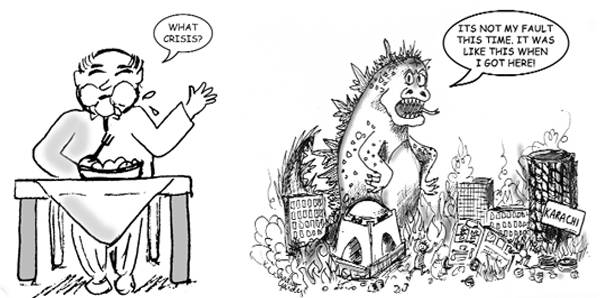
Consumer watchdog
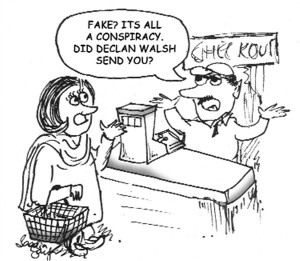
Sir,
It is disillusioning to see how consumer exploitation has pervaded the sale of goods and services, consumer bargaining, product information and other promotional offers in Pakistan. Recently, I witnessed an instance where a customer at Rahat Bakers and Departmental Store in Lahore was given a counterfeit currency note as change. When the customer pointed this out to the sales representative, he denied that it was counterfeit. On being interrogated by the store manager, the cashier refused to acknowledge that he had given the note to the customer.
Such cases of consumer exploitation damage any efforts to build a healthy relationship – one based on trust – between customer and seller. The management of Rahat Bakers must address such issues if they wish to restore consumers’ trust. In addition, there should be a strong, self-regulatory mechanism in place to address similar instances of consumer exploitation on a larger scale.
Aiyza Javaid,
Lahore.
Spy versus spy
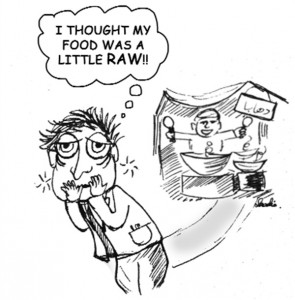
Sir,
The Western media has frequently alleged that Pakistan has secret ties to jihadi outfits through which it aims to damage India’s interests, but what is less often revealed is that India appears to be involved in a proxy war against Pakistan. Foreign Secretary Aizaz Ahmad Chaudhry has claimed that India’s intelligence agency RAW is involved in creating unrest in Pakistan. More recently, certain Pakistan military officers have made similar allegations with respect to RAW’s purported involvement in Balochistan, FATA and Karachi (on the basis of confessions obtained from arrested suspects). The government, however, seems reluctant to unveil any evidence against India.
In reality, India and Pakistan are heading towards a proxy war in Afghanistan at a critical point when ISAF troops are preparing to depart. Afghanistan’s president, Ashraf Ghani, has already warned against this prospect. Unfettered Indian influence in Afghanistan poses a threat to Pakistan, which has, on many occasions, provided evidence to the Indian authorities of their country’s covert support for a number of terrorist acts carried out on Pakistani soil.
Prime Minister Modi’s appointment of Ajit Doval as India’s national security advisor has made the situation worse. In a YouTube video released about a year ago, Doval accused Pakistan of being an enemy of the Indian state and advocated isolating Pakistan internationally or even helping the TTP create internal chaos in the latter country. In this context, the former US secretary for defence, Chuck Hagel, has also indicated that India may be using Afghan soil to finance security problems for Pakistan. Defence analyst John Pike, for example, reports that 35,000 RAW agents entered Pakistan between 1983 and 1993, many having been trained by the KGB during the USSR occupation of Afghanistan. Ironically, the entire thrust of US policy in the Af-Pak region appear to be aimed at preventing Pakistan from becoming an energy corridor between Iran and China. The US knows it cannot contest China economically and industrially and so must counter Chinese influence through subversive tactics.
While India is incensed at the release of Zaki-ur-Rehman Lakhvi, it has also failed to investigate false flag operations within its own territory. The Pakistan government has tried very hard to keep Lakhvi behind bars, but this cannot be done without the evidence needed for a conviction. On the other hand, India did not allow Pakistan’s envoy to investigate Ajmal Kasab – this may be connected to the startling revelations made by Satish Verma, a former IPS-CBI officer, who claimed that the Indian government was responsible for the Mumbai and Indian Parliament attacks in a bid to strengthen counter-terrorism legislation. Or to former Home Minister Sushil Kumar Shinde’s allegations that the BJP and RSS were running training camps to promote terrorism by Hindu extremist groups.
Equally, the media plays an important role in shaping public perceptions. A number of Indian journalists have stirred up national resentment against Pakistan to the extent that those members of civil society who are inclined to think and speak out rationally are often accused of being pro-Pakistan or ISI agents. Anchor Arnab Goswami in his program The Newshour contravened every journalistic ethic when he shouted at a Congress representative that she had “no right” to question Pakistan’s involvement in India.
Peace is not a one-way ticket. Pakistan wants to continue talks with India, but the latter’s efforts to reciprocate have been disappointing. India must make an effort to fight against terrorism – but the best way to start is from a country’s home ground.
Ahsan Ali Zahid and Hasan Ehtisham,
Islamabad.
Helicopter crash
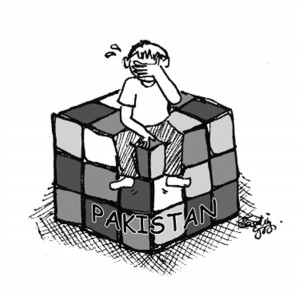
Sir,
The recent tragedy in which a helicopter carrying 19 diplomats and their family members crashed in the Naltar Valley was shocking indeed. The magnitude of this tragedy could have been even greater had the army public school on whose roof the ill-fated helicopter crashed been open and classes in session.
When the Prime Minister was informed of the incident, he cancelled his trip to Gilgit and returned to Islamabad, instructing that the injured be transported immediately to the nearest hospital and provided the best medical treatment available. Undoubtedly, the government responded quickly and efficiently. The Prime Minister expressed his profound grief over the tragic incident and assigned three of his cabinet ministers to accompany the envoys’ bodies. Additionally, he has decided to confer the award of Sitara-e-Pakistan on the deceased Philippine and Norwegian ambassadors and on the spouses of the Malaysian and Indonesian ambassadors. This is bound to be seen as a positive step in their respective countries. Moreover, a day of national mourning was announced on 9 May 2015 to pay the country’s respects to those who had died in the crash while the national flag flew at half-mast at all eminent public buildings in the federal capital.
What remains to be done is to ascertain the cause of the accident. This must be done not only to determine the facts, but also to satisfy the concerns of those who have suffered such colossal losses in the deaths of their nearest and dearest.
M. Fazal Elahi,
Islamabad.
The real McCoy

Sir,
This is with reference to Mr Tariq Ali’s letter in TFT (dated 1–7 May), in which he says that Pakistan was created by men of honour, character and vision – referring to the Quaid-e-Azam and Allama Iqbal. While both were undoubtedly men of character and vision, their respective visions were different. The Quaid firmly believed that the state should have nothing to do with religion whereas Iqbal believed that religion had a role to play, when he said, “Juda ho deen sayasat say to rah jaati hai changazi”.
Given the Quaid’s famous 11 August 1947 speech, in which he proclaimed that Pakistan was a state for people from any faith, any religion and any creed – and for which he was even declared an ‘infidel’ by the self-styled custodians of Islam – it is always disconcerting to hear our politicians and scholars advocate that we follow in the footsteps of the Quaid-e-Azam and Allama Iqbal. Which do they mean? The 11 August speech of one or the concept of changazi proposed by the other?
Mr Ali also attributes the emergence of Pakistan solely to the Quaid and Allama Iqbal. I would argue that, in spirit, the Pakistan movement started on 11 May 1857 when the first solider mutinied against the British in Meerut. Indeed, the sprit of the independence movement was kept alive by numerous leaders, Sir Syed Ahmed Khan being the first to suggest a separate homeland for the Muslims of India. There is no denying that, without the able leadership of Mr Jinnah, we could not have achieved the goal of independence, but with him were other people of integrity, honour, vision and above all sincerity: Liaqat Ali Khan, Raja Sahib Mahmoodabad, the Aga Khan, Sardar Abdul Rab Nishtar, Qazi Issa, Maulvi Fazl-e-Haque, Nawab Mamdoot, the Ali brothers and the unsung heroes of Aligarh University.
Let us not forget all the leaders of the Pakistan movement who fought shoulder to shoulder with the Quaid and who sacrificed everything they had for the cause of Pakistan.
Aamir Aqil,
Lahore.
Carnage in Karachi
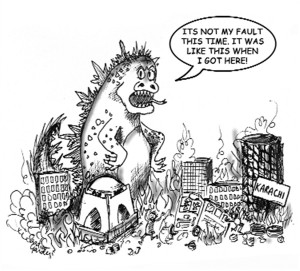
Sir,
The recent brutal murder of over 40 members of the Ismailia community has left one reeling. It is worth remembering that the Ismailis’ spiritual leader, the Aga Khan, had fully supported Jinnah’s political struggle for the Muslims of pre-Partition India. What this country needs is a ruthless operation across the board to crush all those involved in terrorism – irrespective of whether they are affiliated with any political or religious party, or funded by a ‘friendly’ country or a declared foe. We must remember that the struggle for Pakistan was waged by politicians of integrity, not by religious forces or by the military.
The threats that Pakistan now confronts are from within, from a band of misled citizens possibly funded by foreign forces and also from extremist elements within the country, including remnants of the Zia era. As for the Sindh government, what could be more pitiful than a controversial scam in which corrupt members of the bureaucracy and political elite have tried to import substandard armoured vehicles for the police in a province where the law and order situation is even worse than that in FATA.
Every time citizens are massacred in this way, the usual condemnations follow with announcements of compensation close on their heels. But mere lip service or a show of emotion here and there without taking any concrete steps is nothing but hypocrisy. This was a serious security lapse in a city where a semi-emergency is already in force and paramilitary forces have been entrusted to tackle terrorists.
It is unfortunate that the Prime Minister’s choice of words appears to lack a sense of statesmanship. The meeting of the political party heads to discuss the proposed economic corridor could have gone on, but only after a strong message of condemnation was issued and the decision announced to launch a ruthless operation against all those who harbour private militias. It was simply in very poor taste for the Prime Minister to mention lunch. Would those attending the meeting have had the heart to proceed with business as usual had their own sons or daughters been among the people killed?
Ali Malik,
Malaysia.
While Rome burns
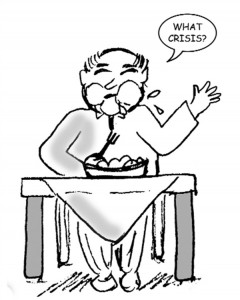
Sir,
I did not feel revulsion on seeing my leaders collectively eating in the immediate aftermath of yet another tragedy in the continuing saga of the tragedy Pakistan has become. Given the unparalleled services rendered to law and order, to economic development, to religious freedoms and integration and to nation building, we could hardly grudge them sustenance. After all, even Nero fiddled as Rome burnt.
A commentator on one of the myriad channels sensationalizing the saga made a most telling comment. ‘Would they be so calmly and callously eating if this had happened to their families?’ he asked. Briefly, that thought appealed and, tempting as it seemed, I realized that the answer lay not in revenge or hate because that pulls us down to the same inhuman level. The answer lies in trying to strengthen systems by making the Constitution a reality instead of a useless piece of paper. So far, that has not succeeded.
With civilian governance failing yet again, we are turning to the military, also yet again, to come to our rescue. Ironically, this is a sad, cyclical event, whether orchestrated or otherwise, where every decade or so, the ability to govern through a genuine, constitutionally supported parliamentary system collapses. We actively seek out the dictatorial alternative. As the pendulum swings back, we decry our chosen ‘saviours’ to seek another farce of democracy. Until the circle of failure is completed once again.
As the current cycle of fratricidal insanity hits epidemic proportions, Karachi’s corps commander has spelt out the obvious solution and we are all agog, as if this were a fresh revelation. Can anyone remember how many times both civil and military leaders have repeated essentially the same mantra? Can anyone remember how, over our chequered history, this has been re-played out like some macabre square-dance, going neither forwards or sideways but inexorably backwards?
The military has been galvanized into action by the Peshawar attack on its own bastions. As always, in the beginning, the right sounds are heard and actions played out. Given the incompetence and collusion of our corrupt and self-seeking civilian leaders, it seems the present circle of failure rapidly is coming to a close. Far too often, the doctrines of necessity and strategic depth have been unable to work in tandem for the overall benefit of the peoples of this potentially great country. Here’s the thing: will it be too much to hope that the justice system will redeem and restore itself from top down? And will it be too much to hope that from its permanent position of strength the military, this time, will support and strengthen that system in the letter and spirit of the Constitution for the greater good of the people and the safety and survival of the nation?
Dr Mervyn Hosein,
Karachi.

